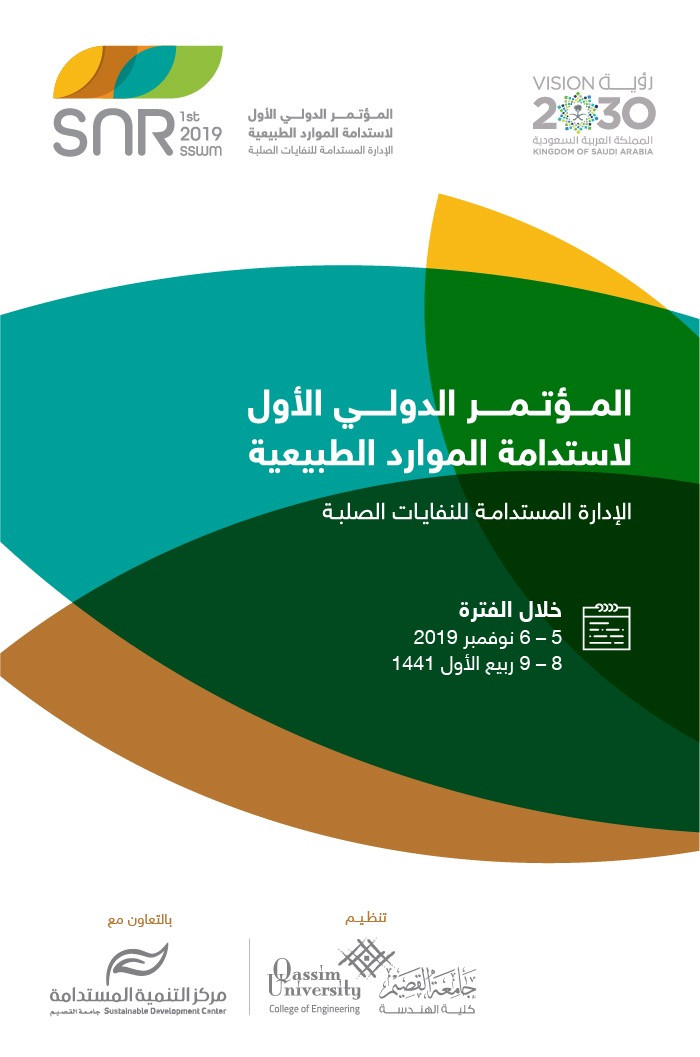The University has announced the schedule of the "First International Conference on Sustainability of Natural Resources: Sustainable Solid Waste Management", organized by the University's College of Engineering, during the period from 6-9 Rabiul Awwal of next year 1441 AH, with the aim of contributing to the preparation of a vision on the sustainable management of solid waste at the national and global level, indicating the size of wasted natural and economic resources and estimating the environmental cost of waste.
The reception of research abstracts wishing to participate in the conference will begin on Sha'ban 26th of this month, by registering on the university's website at the link: sdc2019/ On the 10th of next Ramadan, the acceptance of abstracts will be announced, with early registration closing on Shawwal 12, 1440 A.H. The reception of full research papers will begin on the 4th of Dhu al-Hijjah, and the announcement of their acceptance on Muharram 16, 1441 A.H., before the conference takes place in the month of Rabiul Awwal.
For his part, Prof. Dr. Khalid bin Bani Al-Harbi, UQU Vice President for Development and Quality and Chairman of the Organizing Committee, stressed that this international conference came at this time in line with the Kingdom's vision, which promotes the concepts of sustainability, especially with natural resources to preserve them and invest them in the right way to ensure their permanence and survival for future generations, God willing, pointing out that the per capita consumption rates globally in general and in the Kingdom in particular for some goods and services are among the highest rates, which in turn generates a huge volume of solid waste, which in turn depletes these important resources.
Al-Harbi added that the concept of sustainable development comes to frame this dealing with resources in a moderate manner to ensure their sustainability and preserve them for future generations, hence the importance of applying sustainable solid waste management to achieve optimal utilization of natural resources and maximize their use, and from this comes the importance of encouraging these initiatives aimed at improving sustainable waste management, optimizing the application of modern technologies in this field, and raising community awareness of the nature of the risks resulting from their mismanagement.
The head of the conference's organizing committee believes that raising the level of performance in waste management achieves the sustainability of natural resources, optimal utilization of them, and reducing their depletion, stressing the importance of holding such specialized scientific meetings aimed at shedding light on everything new in this vital field. Qassim University sensed the importance of this topic and adopted the first international conference for the sustainability of natural resources and highlighting the sustainable management of solid waste from its pioneering community role to contribute to raising the efficiency of natural resources management to achieve optimal societal development.
The conference will discuss the necessary measures to transform sustainable food systems in which food waste is minimized, stimulate integration between partners from different disciplines to manage waste sustainably, study opportunities to stimulate investment in the field of developing waste recycling technologies in the Kingdom, study the obstacles to investment in the field of waste conversion industries, build and establish a system for awareness, education and environmental training with the participation of individuals and communities, and link research and studies at Saudi and international universities to the requirements of development and confronting national challenges.
The first theme deals with sustainable waste management practices at all stages: from generation, source separation, collection, transportation, transformation and disposal, and at all levels: planning, management, operation, maintenance and investment, while the second theme deals with how to manage food loss and food waste at the production and consumption level, the third theme discusses investment in waste recycling and downstream industries, and the fourth theme deals with rational waste management from a legal and cultural perspective.
The University sought to organize this conference due to the high per capita consumption rates in the Kingdom of Saudi Arabia for some goods and services, which are among the highest rates globally, which increased the volume of solid waste generated, and the natural resources in the Kingdom are depleted and degraded due to high consumption rates that conflict with the application of sustainable development concepts, in addition to the need to transfer and localize modern international technologies in the field of waste management in accordance with the conditions of the Kingdom, and the need to address the challenges resulting from waste, which is the responsibility of every member of society.
The university also aims to raise community awareness of the risks resulting from waste generation, encourage initiatives aimed at improving sustainable waste management, and provide an opportunity to exchange experiences and knowledge among specialists in waste management and sustainable development.




